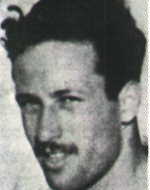Son of Mordechai and Yehudit. Born on 4 February 1948 in Be’er Tuvia, he studied at the Mevo’ot School in Be’er Tuvia, and at the ORT vocational high school in Rehovot, where he was an enthusiastic sports enthusiast and loved to travel around the country. Avishai wrote his resume when he was a candidate for the officers after his induction into the IDF: “I grew up with a twin sister, and I imagine that it was difficult for my parents at the time, but I do not remember feeling The agricultural education, the life of the partnership and the entire framework of the moshav, have left their mark on me in a strong way. ” Avishay was drafted into the Israel Defense Forces in November 1966. In his service, he excelled as a model soldier and as an excellent soldier, and after completing an officers’ course he rose to the rank of lieutenant. New to me, alien or intimidating. The army gives me a feeling of security, of activity for the state and the people living there, the people who built the land where I am safe. All my life I had appreciated them first, who had sowed and sowed, and now I see the possibility of returning them somewhat. I see the future in the army and in agriculture. The ideal point in my life is enlistment and service in the army, but I see my future in agriculture, and especially in agricultural mechanization, and my ideal image excels in honesty and respect for others. Something for the state, the officer can express his ideas in his apprenticeship and give his own, and in the service of the paratroopers I see a challenge and that is, in my opinion, one of the places where something can be done for the state. ” In one of the many songs he left behind, apparently lies a section of his “credo”: “We are the emissaries of a two-million-strong public, to maintain borders and to provide security – to ensure the safety of plowshowers and builders, to reassure a frightened father …” He died on the banks of the canal and was put to rest in the cemetery in Be’er Tuvia, and in “Thirty” of his fall, a “page to a friend” was published in Be’er Tuvia, which included articles on Avishai from various periods of life. “Ort” states that Avishai was a student, who obeyed the instructions of his teachers, of course, but on the other hand he was one of the first to demand justice, not for themselves but for their comrades, who he thought were deprived. “My father came to the paratroopers, because he knew he would not be a pilot, he decided to be among the paratroops – no matter what! But since he learned a profession that refers to the Ordnance Corps, he fought and worked throughout the basic training period on his right to choose his army service. His efforts bore fruit and his volunteering for the paratroopers was approved. Then he was not Simcha with him. But despite the basic training and the rest of the hardships involved, he continued until he completed his officers’ course. “The friend relates that he suited Avishai as a cadet educator, future officer, whom he was inspired by, and was honest, modest and modest. To shape the officer in the IDF, for he was deeply nationalized. My father was essential at the officers’ school, claiming that he was sure that his role as an instructor in an officer’s course was important, but that he knew and felt that the battalion would have a greater contribution and would be realized in practice on the ground. In order to be allowed to serve in the battalion, he did not hesitate to sign a year of army service; On the first anniversary of his downfall, a few pages of the pamphlet were devoted to the image of Avishai. At the beginning, the question of whether Avishai was discussed was discussedWas typical of our youth, or unusual. According to the members’ opinion, he was exceptional and as proof of this they see his joining the regular army. In their opinion, he was educated on the knees of loyalty and responsibility to the state and the people he absorbed in his parents’ home and grandfather. He always saw himself continuing on the farm. “It is a duty,” Avishai once said, “to repay the debt to the people who established the state, so the job now is to continue in the army and immediately return to the agriculture.” But when he was placed in the army for a position that seemed unimportant to him, he turned to the world and claimed: “Is this why I left my parents’ home and farm? And did not rest until he was returned to his unit, in which he saw most of his mission.
